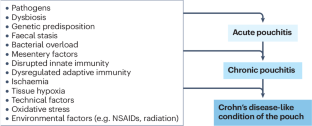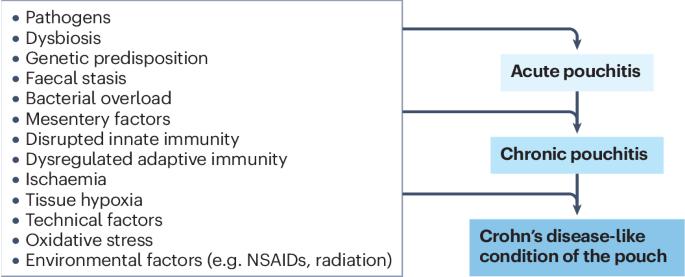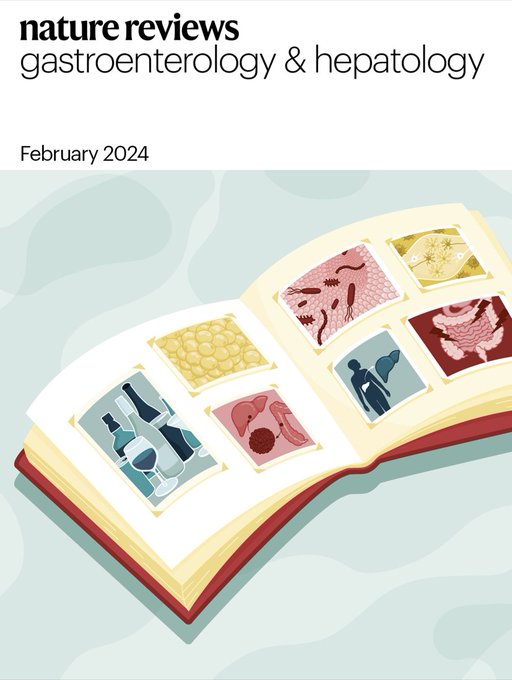Pouchitis: pathophysiology and management
IF 45.9
1区 医学
Q1 GASTROENTEROLOGY & HEPATOLOGY
引用次数: 0
Abstract
Pouchitis is an acute or chronic inflammatory disease of the ileal reservoir. It is common after restorative proctocolectomy with ileal pouch–anal anastomosis, and treatment of chronic antibiotic-refractory pouchitis has proven challenging. Most cases of acute pouchitis evolve into chronic pouchitis. The aetiology of acute pouchitis is likely to be partly related to the gut microbiota, whereas the pathophysiology of chronic pouchitis involves abnormal interactions between genetic disposition, faecal stasis, the gut microbiota, dysregulated host immunity, surgical techniques, ischaemia and mesentery-related factors. Pouchoscopy with biopsy is the most valuable modality for diagnosis, disease monitoring, assessment of treatment response, dysplasia surveillance and delivery of endoscopic therapy. Triggering or risk factors, such as Clostridioides difficile infection and use of non-steroidal anti-inflammatory drugs, should be modified or eradicated. In terms of treatment, acute pouchitis usually responds to oral antibiotics, whereas chronic antibiotic-refractory pouchitis often requires induction and maintenance therapy with integrin, interleukin or tumour necrosis factor inhibitors. Chronic pouchitis with ischaemic features, fistulae or abscesses can be treated with hyperbaric oxygen therapy. Pouchitis is a common condition that can occur after intestinal surgery. In this Review, Shen discusses our current understanding of the multifactorial pathophysiology, diagnosis and management of pouchitis, primarily in patients with underlying ulcerative colitis.


小袋炎:病理生理学和管理
肠袋炎是回肠储层的一种急性或慢性炎症性疾病。它常见于回肠袋-肛门吻合术后的恢复性直肠切除术,慢性抗生素难治性肠袋炎的治疗已被证明具有挑战性。大多数急性肠袋炎会演变为慢性肠袋炎。急性肛门袋炎的病因可能部分与肠道微生物群有关,而慢性肛门袋炎的病理生理学则涉及遗传、粪便淤积、肠道微生物群、宿主免疫失调、手术技术、缺血和肠系膜相关因素之间的异常相互作用。带活检的肛门镜检查是诊断、疾病监测、治疗反应评估、发育不良监测和内镜治疗最有价值的方式。应改变或消除诱发或危险因素,如艰难梭菌感染和使用非甾体抗炎药。在治疗方面,急性胃袋炎通常对口服抗生素有反应,而抗生素难治性慢性胃袋炎通常需要使用整合素、白细胞介素或肿瘤坏死因子抑制剂进行诱导和维持治疗。伴有缺血性特征、瘘管或脓肿的慢性肛门袋炎可采用高压氧疗法进行治疗。
本文章由计算机程序翻译,如有差异,请以英文原文为准。
求助全文
约1分钟内获得全文
求助全文
来源期刊
CiteScore
52.30
自引率
0.60%
发文量
147
审稿时长
6-12 weeks
期刊介绍:
Nature Reviews Gastroenterology & Hepatology aims to serve as the leading resource for Reviews and commentaries within the scientific and medical communities it caters to. The journal strives to maintain authority, accessibility, and clarity in its published articles, which are complemented by easily understandable figures, tables, and other display items. Dedicated to providing exceptional service to authors, referees, and readers, the editorial team works diligently to maximize the usefulness and impact of each publication.
The journal encompasses a wide range of content types, including Research Highlights, News & Views, Comments, Reviews, Perspectives, and Consensus Statements, all pertinent to gastroenterologists and hepatologists. With its broad scope, Nature Reviews Gastroenterology & Hepatology ensures that its articles reach a diverse audience, aiming for the widest possible dissemination of valuable information.
Nature Reviews Gastroenterology & Hepatology is part of the Nature Reviews portfolio of journals.

 求助内容:
求助内容: 应助结果提醒方式:
应助结果提醒方式:


